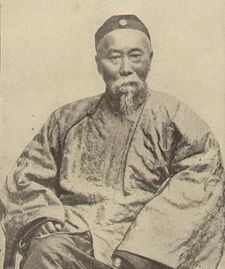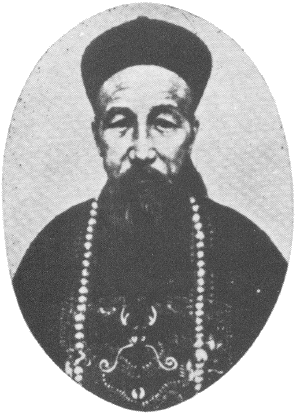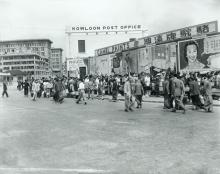The political effects of a kung fu school...
Primary tabs
Submitted by Andrew Craig-Bennett on Sat, 2010-05-01 21:28
We now come to the Righteous Society of Harmonious Fists (if they sound like a kung fu school, that is indeed what they were)...
Largely thanks to four effective modernising Imperial Chinese civil servants Qing China did not collapse under the shock of the Opium Wars and the four great rebellions that they caused.
On the contrary, China recovered and started to moidernise in what is called the Tongxi Restoration (cf the Meiji Restoration in Japan).
The four were:
Li Hongshang,

and Zeng Guofang,

whom I have already mentioned, and two whom I have not mentioned yet, Zhuo Zhongtang

and Robert Hart ...
Hang on! I hear you say .... Robert Hart doesn't sound very much like a Chinese civil servant!

Well, he was one.
Like several other people in this tale, including numerous Governors of Hong Kong and Managers of the Bank, he was a seagreen incorruptible Northern Irish Protestant.
Which is why he was, for forty-six years, the head of the only department of the Qing government that really worked, the Imperial Maritime Customs Service.
And why he was undoubtedly the most trusted mandarin of the Dowager Empress Cixi.
He was completely honest, and the revenues that he collected ran China. All the other taxes disappeared en route.
(Those who are very familiar with a certain prominent Middle Eastern oil based emirate may be able to name an elderly Englishman, Mike B......, formerly in the Parachute Regiment, who occupies just the same sort of position there).
Largely thanks to four effective modernising Imperial Chinese civil servants Qing China did not collapse under the shock of the Opium Wars and the four great rebellions that they caused.
On the contrary, China recovered and started to moidernise in what is called the Tongxi Restoration (cf the Meiji Restoration in Japan).
The four were:
Li Hongshang,

and Zeng Guofang,

whom I have already mentioned, and two whom I have not mentioned yet, Zhuo Zhongtang

and Robert Hart ...
Hang on! I hear you say .... Robert Hart doesn't sound very much like a Chinese civil servant!

Well, he was one.
Like several other people in this tale, including numerous Governors of Hong Kong and Managers of the Bank, he was a seagreen incorruptible Northern Irish Protestant.
Which is why he was, for forty-six years, the head of the only department of the Qing government that really worked, the Imperial Maritime Customs Service.
And why he was undoubtedly the most trusted mandarin of the Dowager Empress Cixi.
He was completely honest, and the revenues that he collected ran China. All the other taxes disappeared en route.
(Those who are very familiar with a certain prominent Middle Eastern oil based emirate may be able to name an elderly Englishman, Mike B......, formerly in the Parachute Regiment, who occupies just the same sort of position there).
The Righteous Society of Harmonious Fists (義和團) were a wushu (kung-fu) school in Northern China who started to take a particularly dim view of Western Imperialism.
In this, they were probably right.
For the past forty years of our tale, since the departure of Sir John Bowring, Hong Kong has been run by British civil servants who are career Governors of Colonies. This particular career specialisation exists because the British Empire has expanded to cover a quarter of the Earth's surface and a quarter of its population.
Hong Kong is one of the most insignificant of the many small colonies in the Empire, just a few squabbling merchants and their hangers-on, on what Lord |Palmerston called "a barren rock", in the middle of South China, and its Governors have been posted there in mid career, en route to bigger and better things.
The place is hardly worth bothering with.
But it does have a good harbour, it is ours, and it can make a Naval base...
as, indeed, it did; here is the headquarters of the China Fleet in 1906, with the original HMS TAMAR, the white ship in the middle distance, used as a "receiving ship" until she was sunk in December 1941 (more of that later):

The latter might be needed, but not because of the Chinese...
Things are changing in China; European Imperialism is at its high water mark, and various Governments, in Paris, Berlin and St Petersburg, not to mention the up and coming new Imperialist power in Dongjing, the East Capital, which is allied to Britain... (sorry, Chinese in-joke, Dongjing is Tokyo) want to carve up the corpse of Qing China and share it out amongst themselves.
The British and the Americans, who between them have led the imperialist charge into China, have had a change of heart and they now want to keep the old corpse of Qing China intact and to help it to modernise. After all, they are the nations who are doing best out of the present state of affairs, with their joint control of Shanghai, etc...
Which is why between them they are staffing the Maritime Customs Service, training the Army and the Navy, etc.
In this, they were probably right.
For the past forty years of our tale, since the departure of Sir John Bowring, Hong Kong has been run by British civil servants who are career Governors of Colonies. This particular career specialisation exists because the British Empire has expanded to cover a quarter of the Earth's surface and a quarter of its population.
Hong Kong is one of the most insignificant of the many small colonies in the Empire, just a few squabbling merchants and their hangers-on, on what Lord |Palmerston called "a barren rock", in the middle of South China, and its Governors have been posted there in mid career, en route to bigger and better things.
The place is hardly worth bothering with.
But it does have a good harbour, it is ours, and it can make a Naval base...
as, indeed, it did; here is the headquarters of the China Fleet in 1906, with the original HMS TAMAR, the white ship in the middle distance, used as a "receiving ship" until she was sunk in December 1941 (more of that later):

The latter might be needed, but not because of the Chinese...
Things are changing in China; European Imperialism is at its high water mark, and various Governments, in Paris, Berlin and St Petersburg, not to mention the up and coming new Imperialist power in Dongjing, the East Capital, which is allied to Britain... (sorry, Chinese in-joke, Dongjing is Tokyo) want to carve up the corpse of Qing China and share it out amongst themselves.
The British and the Americans, who between them have led the imperialist charge into China, have had a change of heart and they now want to keep the old corpse of Qing China intact and to help it to modernise. After all, they are the nations who are doing best out of the present state of affairs, with their joint control of Shanghai, etc...
Which is why between them they are staffing the Maritime Customs Service, training the Army and the Navy, etc.
There was a “scramble” for China as well as the better known “scramble for Africa” amongst the Great Powers.
Germany, France, Japan and Russia were chiefly interested in carving chunks off China; the USA was also in the colonising business in the 1890’s, of course , but as noted above the USA and the UK were interested in holding China together, as they had secured the best deals from the Qing.
Japan was first off the starting blocks; Japan was concerned, almost from the morning after the Meiji restoration in 1868, that a foreign power might seize Korea from the Qing dynasty, which would present a threat to Japan. The solution was, of course to grab Korea for Japan. The first step was to encourage Korean nationalists to declare independence from China, and this was done in the 1870’s. However, the Chinese fought back and there were a series of coups d’etat in Korea with pro-Japan and pro-China factions slaughtering each other. This was settled by the Convention of Tientsin in which both sides agreed to withdraw their armies from Korea and not to supply “military advisers”, etc.
However in 1894 the Korean Emperor faced a mutiny in his army and asked China for military assistance. This breach of the treaty led to war between Japan and China and,unsurprisingly,the complete defeat of China; whose army and navy had been crippled by corruption (the Navy had not been able to buy any ammunition since 1891 because the Dowager Empress used the funds to extend the Summer Palace – any Chinese friend will tell you this story, ideally whilst pointing at the Marble Boat in the Summer palace gardens.
The Chinese Navy, which had been built up by Li Hongchang, was destroyed by the Japanese Navy at the Battle of the Yalu River, the Army was disposed of at the Siege of Weihaiwei, the “independence” of Korea was assured (until 1911 when Japan finished off the job properly) and Japan helped itself to Taiwan. (A rather touching aspect of this war was that the Japanese and Chinese Admirals were personal friends; the Chinese Admiral, Ting, committed suicide after he was forced to surrender, refusing his friend’s offer of political asylum in Japan)..
This catastrophic defeat was one of the immediate causes of the Boxer Rebellion five years later; the “modernisers” had not saved China and “a return to tradition was needed”.
Taiwan had been somewhat "semi-detatched" for several centuries anyway, the Dutch had "bagged it" in the 17th century only to be kicked out by the last of the Ming Dynasty generals, Koxinga, who established the last bit of Ming rule, anywhere, on the island.
Koxinga's granson surrendered to the Qing Kangxi Emperor in 1683 but the Kangxi Emperor described Taiwan as "a ball of mud beyond the seas, of no possible use to anyone" and had to be persuaded to accept the gift. The Qing restricted Han emigration to Taiwan on the sound Confucian grounds that an emigre is unable to tend his ancestors graves, and is therefore ipso facto no longer Chinese.
The mainland Chinese tend to think this about all overseas-Chinese, even today, but perhaps they think it less strongly than they used to, at least in in the cities. In country areas, people still tend to say that the overseas-Chinese are not proper Chinese at all!)
The Japanese were extremely conscientious rulers of Taiwan, building schools and railways and generally running the place extremely well, which is why you will find quite a different attitude to the Japanese amongst the native Taiwanese compared to anywhere else in Asia.
I will pass quickly over the Boxer Rebellion itself; the story is well known and it was essentially a Northern Chinese affair. I’ll come straight to the effect on Hong Kong.
At the peace treaty, the appetite for carving chunks off China was particularly evident; the Kaiser decreed that it was necessary to save the world from the Yellow Peril. He bagged Qingdao, and the second act of the Germans there was to open a brewery according to the Beer Purity Law of whenever-it-was. This was the start of China’s most famous brand of beer.
Germany, France, Japan and Russia were chiefly interested in carving chunks off China; the USA was also in the colonising business in the 1890’s, of course , but as noted above the USA and the UK were interested in holding China together, as they had secured the best deals from the Qing.
Japan was first off the starting blocks; Japan was concerned, almost from the morning after the Meiji restoration in 1868, that a foreign power might seize Korea from the Qing dynasty, which would present a threat to Japan. The solution was, of course to grab Korea for Japan. The first step was to encourage Korean nationalists to declare independence from China, and this was done in the 1870’s. However, the Chinese fought back and there were a series of coups d’etat in Korea with pro-Japan and pro-China factions slaughtering each other. This was settled by the Convention of Tientsin in which both sides agreed to withdraw their armies from Korea and not to supply “military advisers”, etc.
However in 1894 the Korean Emperor faced a mutiny in his army and asked China for military assistance. This breach of the treaty led to war between Japan and China and,unsurprisingly,the complete defeat of China; whose army and navy had been crippled by corruption (the Navy had not been able to buy any ammunition since 1891 because the Dowager Empress used the funds to extend the Summer Palace – any Chinese friend will tell you this story, ideally whilst pointing at the Marble Boat in the Summer palace gardens.
The Chinese Navy, which had been built up by Li Hongchang, was destroyed by the Japanese Navy at the Battle of the Yalu River, the Army was disposed of at the Siege of Weihaiwei, the “independence” of Korea was assured (until 1911 when Japan finished off the job properly) and Japan helped itself to Taiwan. (A rather touching aspect of this war was that the Japanese and Chinese Admirals were personal friends; the Chinese Admiral, Ting, committed suicide after he was forced to surrender, refusing his friend’s offer of political asylum in Japan)..
This catastrophic defeat was one of the immediate causes of the Boxer Rebellion five years later; the “modernisers” had not saved China and “a return to tradition was needed”.
Taiwan had been somewhat "semi-detatched" for several centuries anyway, the Dutch had "bagged it" in the 17th century only to be kicked out by the last of the Ming Dynasty generals, Koxinga, who established the last bit of Ming rule, anywhere, on the island.
Koxinga's granson surrendered to the Qing Kangxi Emperor in 1683 but the Kangxi Emperor described Taiwan as "a ball of mud beyond the seas, of no possible use to anyone" and had to be persuaded to accept the gift. The Qing restricted Han emigration to Taiwan on the sound Confucian grounds that an emigre is unable to tend his ancestors graves, and is therefore ipso facto no longer Chinese.
The mainland Chinese tend to think this about all overseas-Chinese, even today, but perhaps they think it less strongly than they used to, at least in in the cities. In country areas, people still tend to say that the overseas-Chinese are not proper Chinese at all!)
The Japanese were extremely conscientious rulers of Taiwan, building schools and railways and generally running the place extremely well, which is why you will find quite a different attitude to the Japanese amongst the native Taiwanese compared to anywhere else in Asia.
I will pass quickly over the Boxer Rebellion itself; the story is well known and it was essentially a Northern Chinese affair. I’ll come straight to the effect on Hong Kong.
At the peace treaty, the appetite for carving chunks off China was particularly evident; the Kaiser decreed that it was necessary to save the world from the Yellow Peril. He bagged Qingdao, and the second act of the Germans there was to open a brewery according to the Beer Purity Law of whenever-it-was. This was the start of China’s most famous brand of beer.


Comments
The political effects of a kung fu school...
Bravo!